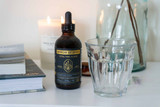Strengthening and Tonifying Herbs in Chinese Herbalism
The Difference Between Tonifying and Strengthening Herbs
Herbs play a vital role in promoting health and wellness. Within the context of Classical Chinese Medicine (CCM) and Traditional Chinese Medicine (TCM), tonifying and strengthening herbs are two key actions and concepts. But what exactly do these terms mean, and how do they differ?
Tonifying vs. Strengthening:
At first glance, tonifying and strengthening herbs might seem synonymous. However, these two actions have distinct roles in enhancing Qi, the universal life force. Tonifying herbs replenish and nourish the body's vital energy, while strengthening herbs improve and optimize the Qi already present.
The Importance of Understanding These Differences:
Knowing when to use tonifying versus strengthening herbs is crucial for effective treatment. Tonifying herbs are ideal when the body is weak or deficient, while strengthening herbs are used to remove blockages and ensure the free flow of Qi.
The Three Levels of Medicine and Qi:
Chinese medicine addresses health on three levels—symptom relief, health promotion, and alignment with destiny. Similarly, Qi operates on three distinct layers within the body: Wei Qi (Protective Qi), Ying Qi (Nutritive Qi), and Yuan Qi (Source Qi). Understanding these levels helps in diagnosing and treating various stages of pathology.
Practical Examples:
- Tonifying Herbs: Chinese Ginseng, American Ginseng, Shilajit, Tongkat Ali
- Strengthening Herbs: Fresh Ginger, Dong Quai, Cyperus, Bupleurum
Key Points from RAW Forest Foods:
As a general observation, especially through work with RAW Forest Foods, there is a “like attracts like” phenomenon. People who are attracted to tonifying herbs are not the ones who need them; they are individuals who have had ample Qi and are now experiencing burnout due to a too Yang-driven life. Adding Yang tonifying herbs to the mix may exacerbate the issue. This is why the TapRoot formula was developed. Since this class of herbs is Yang, more Yang individuals are typically attracted to them. This is particularly evident when excess Yang in life leads to burnout, causing individuals to seek Yang herbs to prop themselves up. However, it is important to consider whether this is the most appropriate solution.
With RAW Forest Foods, it is observed that while most people are more attracted to the Yang herbs (the tonifying herbs), what is really needed are the strengthening herbs. Some, like all of the RAW Pollens, seem to be both adaptogenic (tonifying) and also clearing (strengthening). One of the most reported and appreciated “side effects” of RAW Pine Pollen is that it improves digestion and promotes regularity. Even people who would have never considered themselves to have slow digestion or constipation report much greater digestion and elimination—this directly speaks to the herb’s ability to strengthen the body.
Take-Home Message: Understanding the distinctions between tonifying and strengthening herbs can significantly enhance the efficacy of treatments and promote holistic well-being. It’s important to consider whether Yang tonics or Yin strengthening herbs are needed to achieve the desired balance and health.
For a deeper understanding into the complexities in understanding and using stregthening and tonifying herbs, please see our article "Strengthening and Tonifying Herbs: Levels of Medicine and Treatment."
Site Disclaimers
General Guidence
The content on this site is provided for educational and informational purposes only and should not be construed as medical advice. Always consult a qualified healthcare provider before making changes to your diet, lifestyle, or health regimen, particularly if you are pregnant or nursing, under the age of 18, managing allergies or known sensitivities, or living with any medical conditions.
At RAW Forest Foods, your safety is our priority. Please note that our products are dietary supplements, not medications. The following disclaimer applies:
* These statements have not been evaluated by the Food and Drug Administration. These products are not intended to diagnose, treat, cure, or prevent any disease.
Ingredient Transparency and Allergen Awareness
We are committed to providing transparent ingredient information to help you make informed decisions. If you have or suspect you have allergies to any of our ingredients, we strongly advise against using our products, as allergic reactions can be severe.
Interaction with Medications
If you are taking any medications, consult with your healthcare provider before using supplements. Certain supplements may interact with medications, potentially altering their effectiveness or causing unwanted effects.
For more details, please review our full Terms and Conditions.






